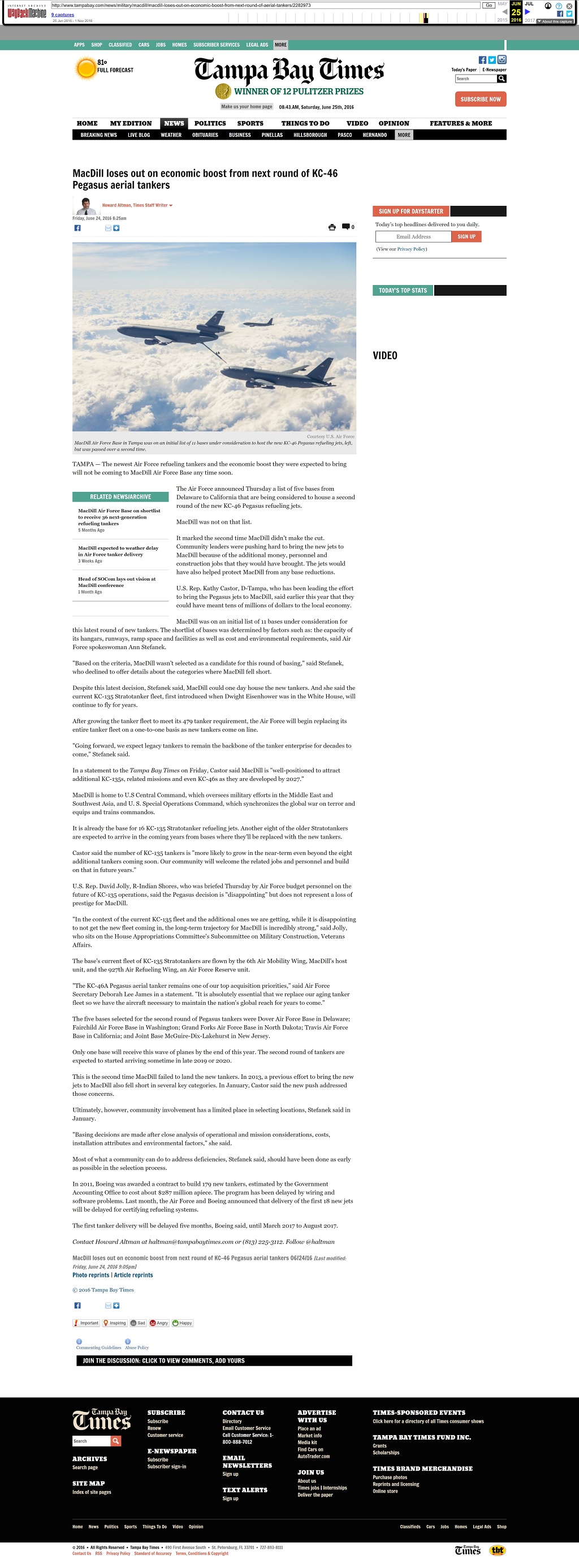
News / Military
By Howard Altman / Tampa Bay Times / June 24, 2016
PHOTO: MacDill Air Force Base in Tampa was on an initial list of 11 bases under consideration to host the new KC-46 Pegasus refueling jets, left, but was passed over a second time. (Courtesy U.S. Air Force)
TAMPA — The newest Air Force refueling tankers and the economic boost they were expected to bring will not be coming to MacDill Air Force Base any time soon.
The Air Force announced Thursday a list of five bases from Delaware to California that are being considered to house a second round of the new KC-46 Pegasus refueling jets.
MacDill was not on that list.
It marked the second time MacDill didn’t make the cut. Community leaders were pushing hard to bring the new jets to MacDill because of the additional money, personnel and construction jobs that they would have brought. The jets would have also helped protect MacDill from any base reductions.
U.S. Rep. Kathy Castor, D-Tampa, who has been leading the effort to bring the Pegasus jets to MacDill, said earlier this year that they could have meant tens of millions of dollars to the local economy.
MacDill was on an initial list of 11 bases under consideration for this latest round of new tankers. The shortlist of bases was determined by factors such as: the capacity of its hangars, runways, ramp space and facilities as well as cost and environmental requirements, said Air Force spokeswoman Ann Stefanek.
“Based on the criteria, MacDill wasn’t selected as a candidate for this round of basing,” said Stefanek, who declined to offer details about the categories where MacDill fell short.
Despite this latest decision, Stefanek said, MacDill could one day house the new tankers. And she said the current KC-135 Stratotanker fleet, first introduced when Dwight Eisenhower was in the White House, will continue to fly for years.
After growing the tanker fleet to meet its 479 tanker requirement, the Air Force will begin replacing its entire tanker fleet on a one-to-one basis as new tankers come on line.
“Going forward, we expect legacy tankers to remain the backbone of the tanker enterprise for decades to come,” Stefanek said.
In a statement to the Tampa Bay Times on Friday, Castor said MacDill is “well-positioned to attract additional KC-135s, related missions and even KC-46s as they are developed by 2027.”
MacDill is home to U.S Central Command, which oversees military efforts in the Middle East and Southwest Asia, and U. S. Special Operations Command, which synchronizes the global war on terror and equips and trains commandos.
It is already the base for 16 KC-135 Stratotanker refueling jets. Another eight of the older Stratotankers are expected to arrive in the coming years from bases where they’ll be replaced with the new tankers.
Castor said the number of KC-135 tankers is “more likely to grow in the near-term even beyond the eight additional tankers coming soon. Our community will welcome the related jobs and personnel and build on that in future years.”
U.S. Rep. David Jolly, R-Indian Shores, who was briefed Thursday by Air Force budget personnel on the future of KC-135 operations, said the Pegasus decision is “disappointing” but does not represent a loss of prestige for MacDill.
“In the context of the current KC-135 fleet and the additional ones we are getting, while it is disappointing to not get the new fleet coming in, the long-term trajectory for MacDill is incredibly strong,” said Jolly, who sits on the House Appropriations Committee’s Subcommittee on Military Construction, Veterans Affairs.
The base’s current fleet of KC-135 Stratotankers are flown by the 6th Air Mobility Wing, MacDill’s host unit, and the 927th Air Refueling Wing, an Air Force Reserve unit.
“The KC-46A Pegasus aerial tanker remains one of our top acquisition priorities,” said Air Force Secretary Deborah Lee James in a statement. “It is absolutely essential that we replace our aging tanker fleet so we have the aircraft necessary to maintain the nation’s global reach for years to come.”
The five bases selected for the second round of Pegasus tankers were Dover Air Force Base in Delaware; Fairchild Air Force Base in Washington; Grand Forks Air Force Base in North Dakota; Travis Air Force Base in California; and Joint Base McGuire-Dix-Lakehurst in New Jersey.
Only one base will receive this wave of planes by the end of this year. The second round of tankers are expected to started arriving sometime in late 2019 or 2020.
This is the second time MacDill failed to land the new tankers. In 2013, a previous effort to bring the new jets to MacDill also fell short in several key categories. In January, Castor said the new push addressed those concerns.
Ultimately, however, community involvement has a limited place in selecting locations, Stefanek said in January.
“Basing decisions are made after close analysis of operational and mission considerations, costs, installation attributes and environmental factors,” she said.
Most of what a community can do to address deficiencies, Stefanek said, should have been done as early as possible in the selection process.
In 2011, Boeing was awarded a contract to build 179 new tankers, estimated by the Government Accounting Office to cost about $287 million apiece. The program has been delayed by wiring and software problems. Last month, the Air Force and Boeing announced that delivery of the first 18 new jets will be delayed for certifying refueling systems.
The first tanker delivery will be delayed five months, Boeing said, until March 2017 to August 2017.
Wayback image

